Mysterious Encounter
 I can’t seem to find the recording of one of Phillip Moffitt’s talks from the Concentration Retreat, in which he opened (and closed) by reading a poem by Rilke (not the one I posted on Friday). The poem is strange and dark — but beautiful — and it has stayed with me whenever I sit. I can often “hear” Phillip’s voice saying, “notice the breath as it arises out of stillness….and returns to stillness….notice the spaciousness between the breaths….the emptiness….and the arising out of emptiness…”
I can’t seem to find the recording of one of Phillip Moffitt’s talks from the Concentration Retreat, in which he opened (and closed) by reading a poem by Rilke (not the one I posted on Friday). The poem is strange and dark — but beautiful — and it has stayed with me whenever I sit. I can often “hear” Phillip’s voice saying, “notice the breath as it arises out of stillness….and returns to stillness….notice the spaciousness between the breaths….the emptiness….and the arising out of emptiness…”
When I find the talk, I’ll post a link. In the mean time, here’s the poem:
Sonnets to Orpheus, Second Part, No. XXIX
by Rainer Maria Rilke, translated by Stephen Mitchell
Silent friend of many distances, feel
how your breath enlarges all of space.
Let your presence ring out like a bell
into the night. What feeds upon your face
grows mighty from the nourishment thus offered.
Move through transformation, out and in.
What is the deepest loss that you have suffered?
If drinking is bitter, change yourself to wine.
In this immeasurable darkness, be the power
that rounds your senses in their magic ring,
the sense of their mysterious encounter
And if the earthly no longer know your name,
whisper to the silent earth: I’m flowing.
To the flashing water say: I am.
You Invisible Poem!
 Sonnets to Orpheus, Part 2, No. I
Sonnets to Orpheus, Part 2, No. I
by Rainer Maria Rilke, translated by Stephen Mitchell
Breathing: you invisible poem! Complete
interchange of our own
essence with world-space. You counterweight
in which I rhythmically happen.
Single wave-motion whose
gradual sea I am;
you, most inclusive of all our possible seas–
space grown warm.
How many regions in space have already been
inside me. There are winds that seem like
my wandering son.
Do you recognize me, air, full of places I once absorbed?
You who were the smooth bark,
roundness, and leaf of my words.
What You Have
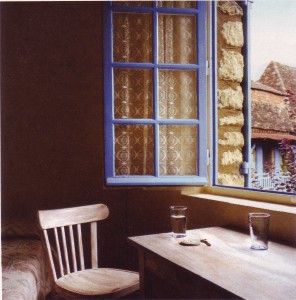 “What you have is all you need.”
“What you have is all you need.”
***
(Photo by Aya Brackett, from a lovely article in the October issue of Mindful magazine, written by Pico Iyer, with reference to his up-coming e-book, “The Art of Stillness: Adventures in Going Nowhere.” )
What the Heart Hears
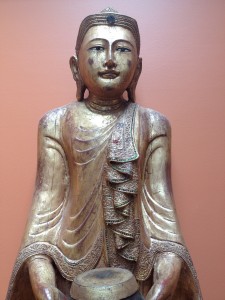 As part of my preparation for the month-long retreat in South Africa next year, I’m taking the Dharmagiri online study course. I started it while I was in Chapel Hill, but then I stopped to go on retreat. In the mean time, one of my DPP Dharma Buddies decided to take the course with me, (Yay, Carolyn!) so I’ve gone back to the beginning and started over again. Which is not a problem, since it’s a go-at-your-own-pace kind of thing.
As part of my preparation for the month-long retreat in South Africa next year, I’m taking the Dharmagiri online study course. I started it while I was in Chapel Hill, but then I stopped to go on retreat. In the mean time, one of my DPP Dharma Buddies decided to take the course with me, (Yay, Carolyn!) so I’ve gone back to the beginning and started over again. Which is not a problem, since it’s a go-at-your-own-pace kind of thing.
In fact, the program actually encourage going back over and doing things again. Module 1, Lesson 1, begins with the title “A Different Way of Learning.” Here’s what it says:
“Before starting, we again emphasize that our stye of Dharma transmission is informed by monastic Buddhism of the Forest School. In this, the embodiment of Dharma teachings is encouraged through repetitive reflection and practice. The goal of the Buddha Dharma is not intellectual prowess or a transfer of information, but a radical shift of alignment from old patters to an alive connection to ever present Dharma. This shift comes about through allowing the practice and teachings to deeply touch and transform the heart. Ajahn Chah encouraged us again and again to listen to the Dharma with our heart, not just our ears.”
Want something really awesome for your heart to listen to? Check out Thanissara and Kittisaro chanting the Recollection of the Triple Jewel. It’s less than 2 minutes long. And it’s heavenly. Click here.
Rapture and Pleasure Born of Seclusion
 Last night I listened again to one of Sally Armstrong’s talks on Concentration Practice, which featured a reading of the Buddha’s description of the first four stages of deep concentration (the four material jhanas). This particular reading is from the Middle Length Discourses, Sutta 119, paragraph 18. (Bhikkhu Bodhi’s translation)
Last night I listened again to one of Sally Armstrong’s talks on Concentration Practice, which featured a reading of the Buddha’s description of the first four stages of deep concentration (the four material jhanas). This particular reading is from the Middle Length Discourses, Sutta 119, paragraph 18. (Bhikkhu Bodhi’s translation)
Just to give you a taste, here’s what it says about the first stage:
“Again, bhikkhus [practitioner], quite secluded from sensual pleasures, secluded from unwholesome states, a bhikkhu enters upon and abides in the first jhana, which is accompanied by applied and sustained thought, with rapture and pleasure born of seclusion. He makes the rapture and pleasure born of seclusion drench, steep, fill, and pervade this body, so that there is no part of his whole body unpervaded by the rapture and pleasure born of seclusion.
“Just as a skilled bath man or bath man’s apprentice heaps bath powder in a metal basin and, sprinkling it gradually with water, kneads it till the moisture wets his ball of bath poster, soaks it and pervades it inside and out, yet the ball itself does not ooze; so too, a bhikkhu makes the rapture and pleasure born of seclusion drench, steep, fill, and pervade this body, so that there is no part of his whole body unpervaded by the rapture and pleasure born of seclusion.”
Sounds pretty cool!
Make of Yourself a Light
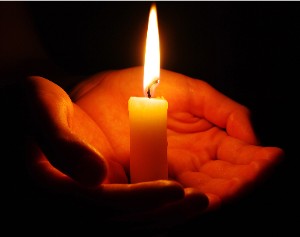 At yesterday’s Sunday Sangha, Christine ended the sitting with one of the few poems by Mary Oliver that, surprisingly, I haven’t often heard as part of a Dharma talk. (Although of course, I have heard this quote from the Buddha.)
At yesterday’s Sunday Sangha, Christine ended the sitting with one of the few poems by Mary Oliver that, surprisingly, I haven’t often heard as part of a Dharma talk. (Although of course, I have heard this quote from the Buddha.)
The Buddha’s Last Instruction
by Mary Oliver
“Make of yourself a light,”
said the Buddha,
before he died.
I think of this every morning
as the east begins
to tear off its many clouds
of darkness, to send up the first
signal–a white fan
streaked with pink and violet,
even green.
An old man, he lay down
between two sala trees,
and he might have said anything,
knowing it was his final hour.
The light burns upward,
it thickens and settles over the fields.
Around him, the villagers gathered
and stretched forward to listen.
Even before the sun itself
hangs, disattached, in the blue air,
I am touched everywhere
by its ocean of yellow waves.
No doubt he thought of everything
that had happened in his difficult life.
And then I feel the sun itself
as it blazes over the hills,
like a million flowers on fire–
clearly I’m not needed,
yet I feel myself turning
into something of inexplicable value.
Slowly, beneath the branches,
he raised his head.
He looked into the faces of that frightened crowd.
Dharma Kitchen: Pickled Carrots
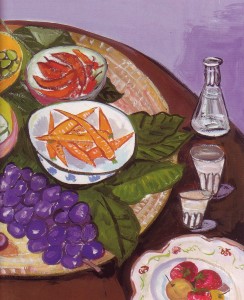 It’s great to be back…but there’s no food in the house! No problem. I’ll just whip up a little something from the Garrison Institute Kitchen cookbook.
It’s great to be back…but there’s no food in the house! No problem. I’ll just whip up a little something from the Garrison Institute Kitchen cookbook.
Pickled Carrots
These may be served as a condiment or side dish. They’re a bright complement to the rich, spicy Thai curry served at the Garrison Institute.
4 large carrots, peeled and thinly sliced
1/3 cup water
1/3 cup rice vinegar
1 Tbsp. salt
1 Tbsp. raw sugar
The carrots can be sliced using a mandolin or shredded using a box grater or food processor. In a small pot over medium heat combine the water, vinegar, salt and sugar. Cook until the sugar is dissolved. Pour the liquid over the carrots and let them sit in the refrigerator for at least 10 minutes. (You can make these a day or two ahead and store them in the frig.)
***
Illustration by Maira Kalman, from “Food Rules, An Eaters Manuel,” by Michael Pollan
Coming Home
 I leave Chapel Hill tomorrow morning for a 2-day drive back to St. Louis. If all goes well, I’ll be home late Wednesday night, but I probably won’t be ready to post right away. So check back again sometime after Friday, Sept 5.
I leave Chapel Hill tomorrow morning for a 2-day drive back to St. Louis. If all goes well, I’ll be home late Wednesday night, but I probably won’t be ready to post right away. So check back again sometime after Friday, Sept 5.
In the mean time, I leave you with this list of “sayings, wise saws, and small stones from the Valley,” found in one of the new-to-me books I discovered at the Chapel Hill library: Aways Coming Home, by Ursula LeGuin. (published in 1985)
* Judgement is poverty.
* When I’m afraid, I listen to the silence of the field mouse. When I’m fearless, I listen to the silence of the mousing cat.
* If you don’t teach machines and horses to do what you want in their way, they’ll teach you to do what they want in your way.
* To go again where you have gone: Increase. To go backwards: Danger. Better to come round.
* Owning is owning, having is hoarding.
* The great hunter: one arrow in his quiver, one thought in his head.
* “Like” and “different” are quickening words, brooding and hatching. “Better” and “worse” are eggsucking words, they leave only the shell.
* Cats may be green somewhere else, but the cats here don’t care.
* Nothing can make water better.
Why We Practice
 We don’t go on retreat — or practice daily meditation — to become good meditators. We do it to calm and quiet our minds so we can see how they work, how they lead us to more suffering, or to less, and in this way we train our minds to be able to see how to choose one over the other. We do this on the cushion so that when we get up and go about our business, we have more of a chance to suffer less.
We don’t go on retreat — or practice daily meditation — to become good meditators. We do it to calm and quiet our minds so we can see how they work, how they lead us to more suffering, or to less, and in this way we train our minds to be able to see how to choose one over the other. We do this on the cushion so that when we get up and go about our business, we have more of a chance to suffer less.
First you perfect your instrument. Then you just play.
— Charlie Parker
First Burma, Now Africa!
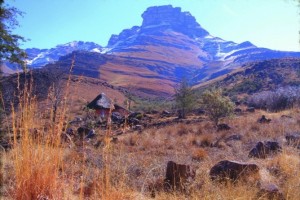 I’m off the wait list and I’ve sent in my deposit, so it’s official: I’m going to Africa! In January I’ll be attending a month-long retreat led by Kittisaro and Thanissara at Dharmagiri Hermitage, a 3-hour bus ride from Durbin, South Africa (which is in the southeast part of the country, on the Indian Ocean coast).
I’m off the wait list and I’ve sent in my deposit, so it’s official: I’m going to Africa! In January I’ll be attending a month-long retreat led by Kittisaro and Thanissara at Dharmagiri Hermitage, a 3-hour bus ride from Durbin, South Africa (which is in the southeast part of the country, on the Indian Ocean coast).
There’s no VISA required, and no need for shots or malaria meds. And there’s a direct flight from Atlanta to Johannesburg, so really, this is going to be a lot easier than the trip to Burma. Still pretty exotic, though!
The plan right now is to fly from St. Louis to Atlanta (an hour and a half flight), then onto Johannesburg (15 hours), then spend the night and a day getting un-jetlagged, then fly to Durbin (3 hours), then take the bus to Dharmagiri (3 hours). The retreat starts at 7pm on January 6 and ends at 7am on February 2.
In between, there will be 2 weeks of practice in the Theravada tradition followed by 2 weeks in Mahayana. The first part will be pretty much a regular Spirit Rock-type vipassana retreat, but the second part sounds quite different.
The website says the Mahayana practice will focus on the Bodhisattva Way through the cultivation of the Kuan Yin Dharmas. The Bodhisattva heart balances the “letting go” practices of Theravada with “picking up” a skillful and compassionate relationship to the world. The archetype of compassionate wisdom in Mahayana is the Bodhisattva Avalokitesvara (Khan Yin), the “One Who Regards the Sounds of the World with Ease.”
The two dimension of Kuan Yin Dharma we will practice:
* The cultivation of a “field of blessings” through the focus of mind using mantra, ceremony and the reality of profound inter-connectedness within the immanence of awareness.
* The “investigation of emptiness,” through the Chan practice of “turning the mind back” onto itself, which is also resonant with the non-dual approach of Zen, Vedanta and Self Inquiry.
Cool!
